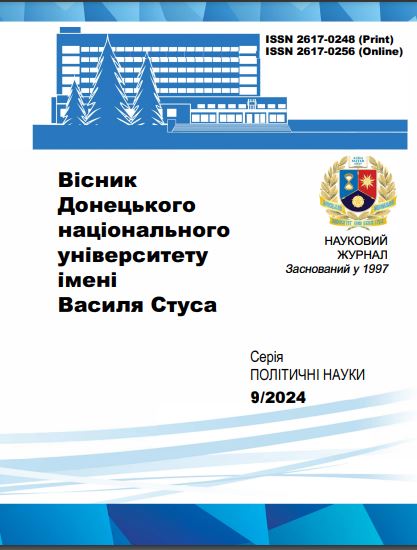Non-governmental organisations as groups of the ‘third sector’ in civil society
DOI:
https://doi.org/10.31558/2617-0248.2024.9.8Keywords:
non-governmental organisations, civil society, public associations, international organisations, democratic values, Ukraine, Europe, the United StatesAbstract
The role of NGOs in the functioning of modern civil society is analysed. It is found that NGOs can be granted the status of one of three levels: consultative, registered and special consultative; that the comprehensive association of all types of NGOs is divided into two main categories: those that serve others (and have large financial resources) are called intermediaries, and those that are served by intermediaries are called public organisations. It is shown that NGOs have different acronyms, which are often used subjectively and interchangeably.
It is found that NGOs, which are called the ‘third sector’ group in civil society, play several constructive roles: they can give a voice to groups affected by globalisation – human rights issues, environmental rights, rights of religious communities, animal rights, students’ issues, women’s groups, professional associations and form a very broad coalition. The effectiveness of NHRIs for civil society is undeniable, their numbers are growing worldwide and their voices in civil society are becoming stronger as they represent a variety of global issues. The systematic reasons for low efficiency in the activities of NGOs are systematised: small membership, lack of funds, internal government restrictions, lack of access to physical resources, internal systems of checks and balances, etc.
It was found that NGOs oriented towards democratic values usually reject authoritarian rule, whether on the left or the right, as inherently corrupting and exploitative. They profess the democratic principle that sovereignty belongs to the people. Therefore, regimes will view NGOs as a political and social force for strengthening pluralism and checking the power of the state in relation to civil society. They will emphasise the role of NGOs as catalysts for social and institutional innovation and stress the importance of preserving NGO independence.
References
Staniszkis, J. (1991). Political capitalism. In: Poland. East European Politics and Societies, Vol. 5, N 1, рp. 127-141.
Starkey, K. & Madan, P. (2001). Bridging the Relevance Gap: Aligning Stakeholders in the Future of Management Research. British Journal of Management, 12 (SI), pp. 3-26.
Mafunisa, John Mutuwafhethu (2004). The Role of Civil Society in Promoting Good Governance in the Republic of South Africa. International Review o f Administrative Sciences, 70, no.3, pp. 487-495.
Lucan, Way. (2014). Civil Society and Democratization. Journal of Democracy, pp. 35-43.
Moyo, Dambisa. (2009). Dead Aid: Why Aid is Not Working and How There is a Better Way for Africa. Farrar, Straus and Giroux, New York, 2009, pр.37-51.
Jenkins, J.C. (1987). Nonprofit organizations and policy advocacy. In W.W. Powell (ed.), The Nonprofit Sector: A Research Handbook. New Haven, CT: Yale University Press, pp. 296–318.
Edwards, Michael & David Hulme (1996). Beyond the Magic Bullet: NGO Perfonnance and Accountability in the Post-Cold War. Kumarian Press, Inc., рр. 61-69.
Kuts, Svitlana (2000): The Role of the Private Sector in the Public Service of the Ukraine: Social-political Governance Perspective. Public Management 2(3), 329-347.
Fowler, A., (1995). Assessing NGO Performance: Difficulties, Dilemmas and a Way Ahead, in Edwards and Hulme, (eds.). Beyond the Magic Bullet: NGO Performance and Accountability in the Post-Cold War World, pp. 169-186.
Szporluk, Michael. (2009). A Framework for Understanding Accountability of International NGOs and Global Good Governance. Indiana Journal o fGlobal Legal Studies, 16, no. l, Proquest, pp.339-361.
Riemann, Kim D. (2006). A View from the Top: International Politics, Norms and the Worldwide Growth of NGOs. International Studies Quarterly, 50, no. I, p. 62-76/
Sommer, R. (1977). Classroom layout. Theory into Practice, 16(3), 174-175.

